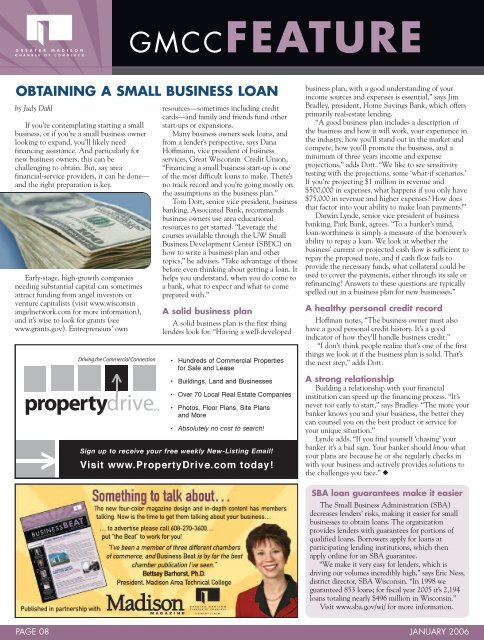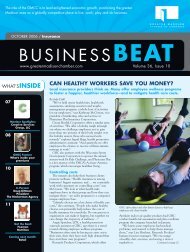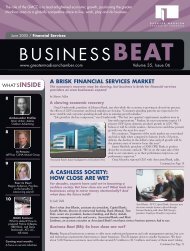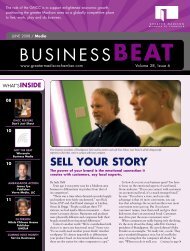January - Madison Magazine
January - Madison Magazine
January - Madison Magazine
You also want an ePaper? Increase the reach of your titles
YUMPU automatically turns print PDFs into web optimized ePapers that Google loves.
GMCCFEATURE<br />
OBTAINING A SMALL BUSINESS LOAN<br />
by Judy Dahl<br />
If you’re contemplating starting a small<br />
business, or if you’re a small business owner<br />
looking to expand, you’ll likely need<br />
financing assistance. And particularly for<br />
new business owners, this can be<br />
challenging to obtain. But, say area<br />
financial-service providers, it can be done—<br />
and the right preparation is key.<br />
Early-stage, high-growth companies<br />
needing substantial capital can sometimes<br />
attract funding from angel investors or<br />
venture capitalists (visit www.wisconsin<br />
angelnetwork.com for more information),<br />
and it’s wise to look for grants (see<br />
www.grants.gov). Entrepreneurs’ own<br />
resources—sometimes including credit<br />
cards—and family and friends fund other<br />
start-ups or expansions.<br />
Many business owners seek loans, and<br />
from a lender’s perspective, says Dana<br />
Hoffmann, vice president of business<br />
services, Great Wisconsin Credit Union,<br />
“Financing a small business start-up is one<br />
of the most difficult loans to make. There’s<br />
no track record and you’re going mostly on<br />
the assumptions in the business plan.”<br />
Tom Dott, senior vice president, business<br />
banking, Associated Bank, recommends<br />
business owners use area educational<br />
resources to get started. “Leverage the<br />
courses available through the UW Small<br />
Business Development Center (SBDC) on<br />
how to write a business plan and other<br />
topics,” he advises. “Take advantage of those<br />
before even thinking about getting a loan. It<br />
helps you understand, when you do come to<br />
a bank, what to expect and what to come<br />
prepared with.”<br />
A solid business plan<br />
A solid business plan is the first thing<br />
lenders look for. “Having a well-developed<br />
business plan, with a good understanding of your<br />
income sources and expenses is essential,” says Jim<br />
Bradley, president, Home Savings Bank, which offers<br />
primarily real-estate lending.<br />
“A good business plan includes a description of<br />
the business and how it will work, your experience in<br />
the industry, how you’ll stand out in the market and<br />
compete, how you’ll promote the business, and a<br />
minimum of three years income and expense<br />
projections,” adds Dott. “We like to see sensitivity<br />
testing with the projections, some ‘what-if scenarios.’<br />
If you’re projecting $1 million in revenue and<br />
$500,000 in expenses, what happens if you only have<br />
$75,000 in revenue and higher expenses How does<br />
that factor into your ability to make loan payments”<br />
Darwin Lynde, senior vice president of business<br />
banking, Park Bank, agrees. “To a banker’s mind,<br />
loan-worthiness is simply a measure of the borrower’s<br />
ability to repay a loan. We look at whether the<br />
business’ current or projected cash flow is sufficient to<br />
repay the proposed note, and if cash flow fails to<br />
provide the necessary funds, what collateral could be<br />
used to cover the payments, either through its sale or<br />
refinancing Answers to these questions are typically<br />
spelled out in a business plan for new businesses.”<br />
A healthy personal credit record<br />
Hoffman notes, “The business owner must also<br />
have a good personal credit history. It’s a good<br />
indicator of how they’ll handle business credit.”<br />
“I don’t think people realize that’s one of the first<br />
things we look at if the business plan is solid. That’s<br />
the next step,” adds Dott.<br />
A strong relationship<br />
Building a relationship with your financial<br />
institution can speed up the financing process. “It’s<br />
never too early to start,” says Bradley. “The more your<br />
banker knows you and your business, the better they<br />
can counsel you on the best product or service for<br />
your unique situation.”<br />
Lynde adds, “If you find yourself ‘chasing’ your<br />
banker it’s a bad sign. Your banker should know what<br />
your plans are because he or she regularly checks in<br />
with your business and actively provides solutions to<br />
the challenges you face.” ◆<br />
SBA loan guarantees make it easier<br />
The Small Business Administration (SBA)<br />
decreases lenders’ risks, making it easier for small<br />
businesses to obtain loans. The organization<br />
provides lenders with guarantees for portions of<br />
qualified loans. Borrowers apply for loans at<br />
participating lending institutions, which then<br />
apply online for an SBA guarantee.<br />
“We make it very easy for lenders, which is<br />
driving our volumes incredibly high,” says Eric Ness,<br />
district director, SBA Wisconsin. “In 1998 we<br />
guaranteed 853 loans; for fiscal year 2005 it’s 2,194<br />
loans totaling nearly $496 million in Wisconsin.”<br />
Visit www.sba.gov/wi/ for more information.<br />
PAGE 08 JANUARY 2006
















